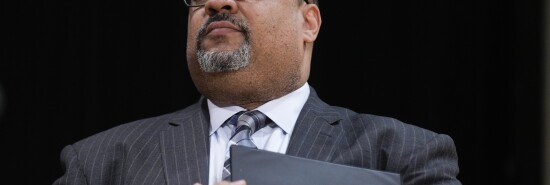
Donald Trump arrest: Whom did Trump ‘defraud’ in 34 felony counts of hush money payments?
Tiana Lowe
Video Embed
More than half a decade after the Trump Organization reimbursed convicted perjurer Michael Cohen for a hush money payment to Stormy Daniels, Alvin Bragg has bet $200 million of taxpayer money and his political career on the 34 felony counts with which he charged Donald Trump today. The former president has denied all wrongdoing. Contrary to the left-leaning media’s assertion that Trump would be indicted on conspiracy charges, all 34 counts are charges of falsifying business records in the first degree.
Unlike the misdemeanor charge of falsifying business records in the second degree, the first degree felony has a statute of limitations of five years, not two. But every indictment listed occurred in 2017, outside the statute of limitations.
SEE IT: THE EXTRAORDINARY MOMENT TRUMP SURRENDERS HIMSELF TO AUTHORITIES
Still, the biggest barrier to Bragg’s prosecution may not be the Manhattan district attorney’s dubious legal inventions to claim that Trump’s “tolled time” outside of New York City allows for extending the statute of limitations. Rather, the charges themselves require Trump to have defrauded someone in writing off his payments (or repayments) to Cohen as a business expense.
New York law stipulates that someone can only be guilty of falsifying business records “when he commits the crime of falsifying business records in the second degree, and when his intent to defraud includes an intent to commit another crime or to aid or conceal the commission thereof.”
Ignore the notion of the underlying crime here, which in Trump’s case, would not be under Bragg’s jurisdiction. If Trump had an intent to defraud — and New York State has a high bar for what constitutes “intent” — there has to be a victim whom Trump was defrauding.
CLICK HERE TO READ MORE FROM THE WASHINGTON EXAMINER
Recall that, by bookkeeping the payments to Cohen as services paid rather than a reimbursement, the Trump Organization theoretically created a greater tax liability than it would have otherwise. After all, business expense reimbursements are not considered taxable. So is the Trump Organization supposed to have defrauded itself?
As evinced by Bragg’s entire crusade thus far, he views the victim as the voter — as though the country would have been shocked to learn that Trump was a serial philanderer had Cohen been unable to pay Stormy Daniels in exchange for her signing a non-disclosure agreement. That seems like dubious legal alchemy. Unless Bragg can invent another victim of Trump’s supposed intent to defraud, the 2024 hopeful has much to be optimistic about.
